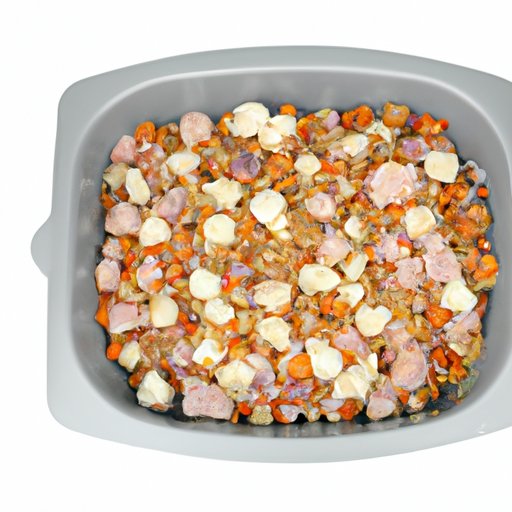
I. Introduction
Many dogs struggle with maintaining a healthy weight, and it can be especially concerning when our furry friends become underweight. Not only does being underweight make dogs more susceptible to illnesses and injuries, but it can also be a sign of underlying health issues or improper nutrition. In this article, we will explore various ways to help your underweight dog gain weight fast, including high-calorie dog food options, homemade recipes, supplements and vitamins, safe weight gain strategies, making mealtime exciting for picky eaters, and top foods and ingredients for quick weight gain.
II. High-Calorie Dog Food Options
One of the most straightforward ways to help your underweight dog gain weight is by feeding them high-calorie dog food. These types of food are designed to pack a lot of nutrition and calories into a small serving size and can help your dog gain weight quickly and healthily. Some popular brands of high-calorie dog food include Wellness CORE High-Protein, Blue Buffalo Wilderness, and Purina Pro Plan Sport.
When selecting high-calorie dog food, it’s essential to consider your dog’s age, breed, and health needs. Some high-calorie dog foods may be too rich for certain dogs, while others may not contain enough of the necessary nutrients for healthy weight gain. Always check with your veterinarian before switching your dog’s food and incorporate new food gradually, so as not to upset their digestive system.
III. Homemade Recipes for Weight Gain
Homemade dog food can be an excellent option for dogs who struggle to gain weight, as it allows you to control the ingredients and nutrients that your dog is consuming. When making homemade dog food, it’s important to include high-calorie, nutrient-dense ingredients like meats, fatty fish, eggs, and vegetables. Some good homemade dog food recipes for weight gain include beef and vegetable stew, turkey and sweet potato mash, and salmon and brown rice casserole.
Before feeding your dog homemade food, be sure to research appropriate portion sizes, as well as any ingredient restrictions based on your dog’s breed, age, and health. You should also be aware of food safety issues, such as avoiding harmful foods like onions and grapes and ensuring that all meats are cooked thoroughly before serving.
IV. Supplements and Vitamins for Weight Gain and Health
In addition to changing your dog’s diet, supplements and vitamins can help promote healthy weight gain and overall health. Some popular supplements and vitamins for dogs include omega-3 and omega-6 fatty acids, multivitamins, and probiotics. These types of supplements can help improve your dog’s coat and skin health, immune system function, and digestive health, all of which can contribute to healthy weight gain.
When giving your dog supplements and vitamins, always follow the dosage instructions carefully. Some types of supplements can be toxic in high doses, so it’s important to stay within the recommended guidelines. Additionally, not all supplements and vitamins are appropriate for all dogs, so consult with your veterinarian before starting any new supplement regimen.
V. Strategies for Safe Weight Gain
While it may be tempting to overfeed your underweight dog to help them gain weight quickly, it’s essential to do so safely and in a controlled manner. Overfeeding can lead to obesity and other health issues, which can be just as detrimental to your dog’s health as being underweight. Instead, focus on slowly increasing your dog’s calorie intake through small, frequent meals and calorie-dense snacks.
Other strategies for safe weight gain include increasing exercise to promote muscle growth and mass, monitoring your dog’s weight gain progress with regular weigh-ins, and adjusting calorie intake based on your dog’s changing needs. Remember that healthy weight gain takes time, and the key is to maintain a balance between calorie intake and exercise to ensure consistent, safe weight gain.
VI. Making Mealtime Exciting for Picky Eaters
If your underweight dog is a picky eater, it can be challenging to find foods that they will enjoy and eat consistently. However, adding variety and flavor to their diet can help stimulate their appetite and make mealtime more exciting. One simple way to do this is to add tasty toppers to their food, like gravy, canned fish, or a spoonful of canned pumpkin.
Other ideas for making mealtime exciting include rotating between different types of food, like kibble, canned food, and homemade meals, and offering high-value treats as rewards for eating. Additionally, establishing a consistent feeding schedule and creating a positive feeding environment can help reduce stress and anxiety around mealtime, making it easier for your dog to eat.
VII. Top Foods and Ingredients for Quick Weight Gain
Some of the most calorie-dense foods and ingredients for dogs include chicken, beef, turkey, pork, eggs, whole milk yogurt, sweet potatoes, oats, and brown rice. Incorporating these foods into your dog’s diet can help them gain weight quickly while providing necessary macronutrients, like protein and carbohydrates, and micronutrients, like vitamins and minerals, for overall health.
One great recipe for quick weight gain is beef and quinoa casserole. To make this recipe, cook ground beef and quinoa together in a pot and then add in diced sweet potatoes, carrots, and low-sodium beef broth. Let simmer until all ingredients are soft and then serve small portions to your dog throughout the day.
VIII. Conclusion
If your dog is underweight, it’s essential to take action and help them gain weight in a healthy, safe manner. By following the tips and recipes outlined in this article, you can create a meal plan that satisfies your dog’s nutritional needs and helps them gain weight at a steady, safe pace. Remember to consult with your veterinarian before making any changes to your dog’s diet and to monitor your dog’s weight gain progress regularly. With a little patience, effort, and love, you can help your underweight dog reach their optimal weight and live a healthy, happy life.





